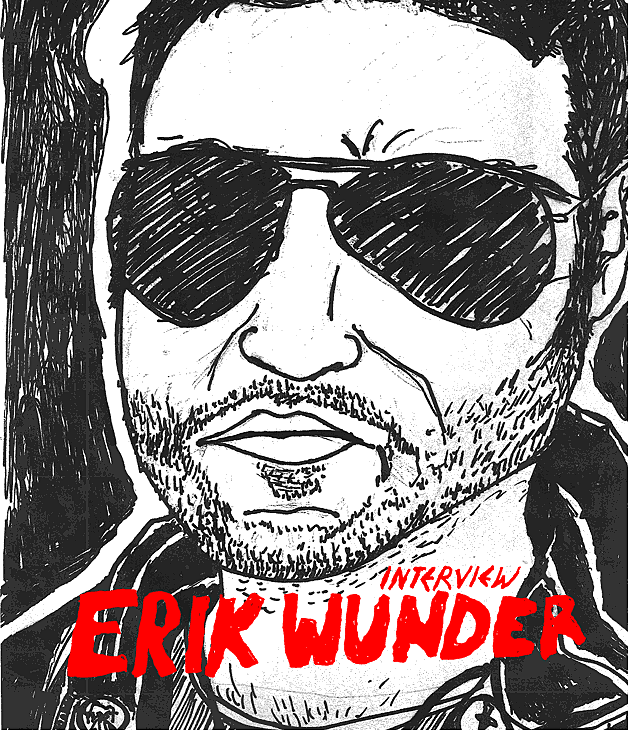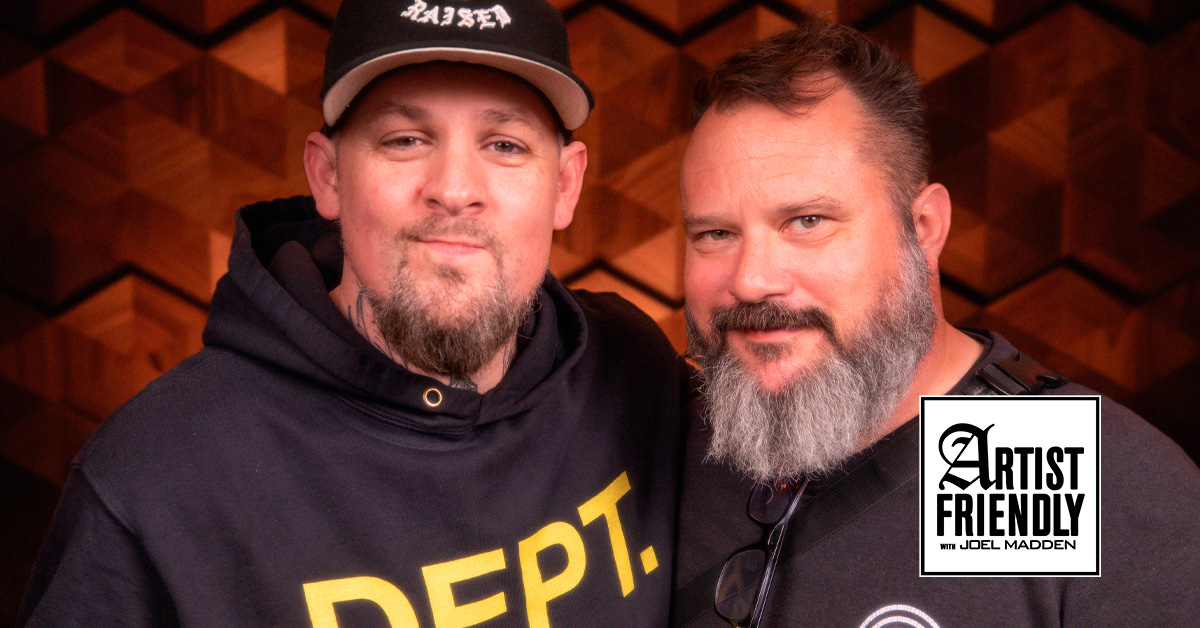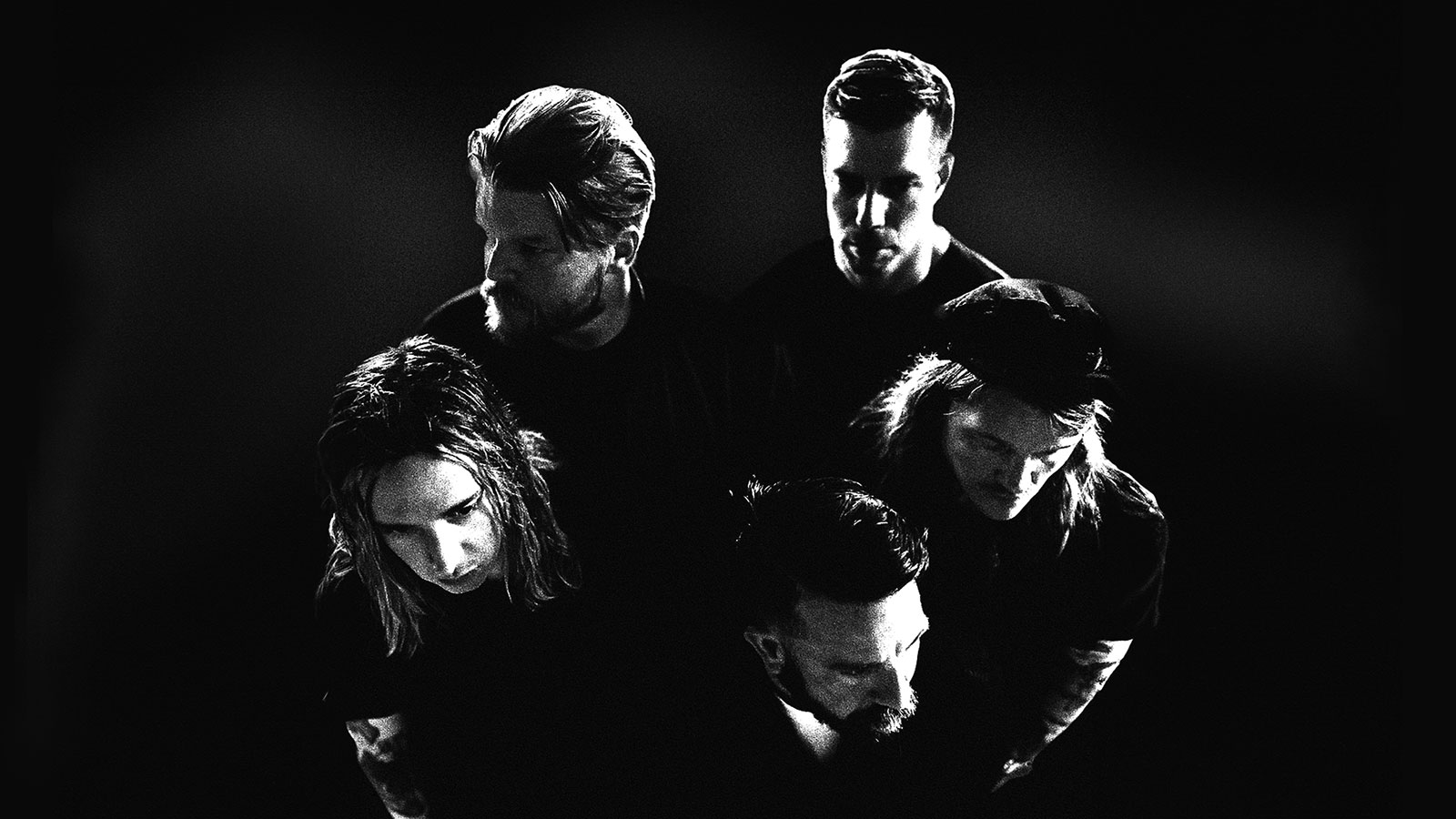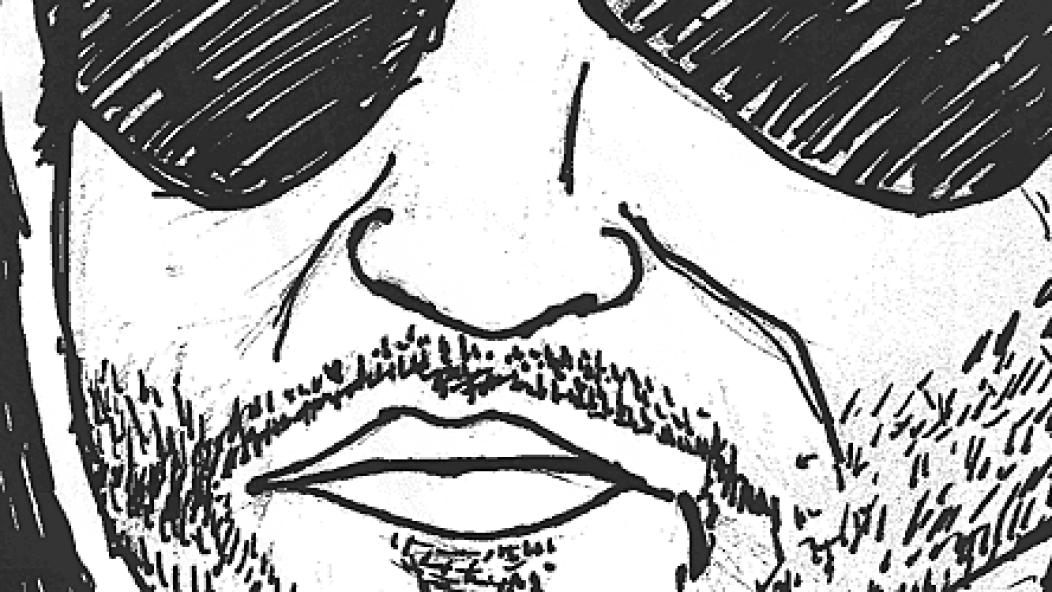
Interview: Erik Wunder of Cobalt & Man's Gin
American black metal has experienced exponential growth over the last few years, but in my opinion, the scene reached an apotheosis of sorts in March 2009, with the release of Cobalt’s Gin (Profound Lore), an album that truly, viscerally expanded the possibilities of black metal, both musically and thematically. Much of the press dedicated to that album focused on the band’s vocalist, Phil McSorley, in no small part due to McSorley’s day job: as a soldier in the U.S. Army who had done numerous tours in Iraq. But anyone who actually listened to Cobalt’s dizzying, assaultive, expansive, groundbreaking black metal knew the depth of the duo’s partnership; they knew that Erik Wunder, the multi-instrumentalist behind the music of Cobalt, was one of metal’s most exciting visionaries.
Back then, while McSorley was being moved between several military stations internationally, Wunder was living in Denver—about 60 miles from Greely, Colorado, the city in which Wunder and McSorley met as teenagers. But in spring 2009, Wunder relocated to Brooklyn (although he is, curiously, never mentioned in any coverage of the borough’s thriving metal scene), where he got serious with Man’s Gin, the musical project for which he started writing in 2005. In 2010, Man’s Gin released its debut, Smiling Dogs (also on Profound Lore). Nothing about Man’s Gin is black metal—Smiling Dogs is bleak, spare Americana: haunted folk, boozy jams, grunge anthems and murder ballads. Wunder’s full-bodied vocals recall Alice in Chains’ late singer, Layne Staley, another man whose pipes were capable of turning the darkest of nightmares into lighter-waving sing-alongs for winos and disaffected dirtbags. So . . . not black metal, no; but black as coal just the same.
Now, Wunder is settled in Brooklyn, preparing new music for both Cobalt and Man’s Gin, and the future prospects for both bands are tremendously exciting (including discussion of some Cobalt live performances while McSorley is on American soil). Wunder and I started work on this interview in November 2011, through a series of emails, and it progressed over the months between then and now. I wanted to talk to him about all of his musical endeavors, and as he started talking about his music, he began sharing with me much greater ambitions, emotions and insights, too.
. . .
Let’s start somewhere close to the beginning here: When Phil started Cobalt, it was not called Cobalt, but Grimness Enshroud—a perfectly kvlt-sounding name. When you joined, you guys changed the band’s name to Cobalt. I have an inexplicably strong visceral reaction to the name Cobalt, but let’s face it: to many/most people, it might sound a little vague—it’s a mineral, a shade of blue, a Chevy model. So where the hell did the name come from, and what does it say about you as a band? Why did it speak to you?
Phil came up with the name for that very reason. It is vague. It doesn’t really mean anything directly. It is very elemental. Cobalt is an element found in the periodic table. It was also a metal that deceived early American silver miners. In a sense, it’s a cousin to fool’s gold. There are old folklore tales about superstitious silver miners who would call a cave demon ‘Cobalt’ because the tricky bastard would come through and replace all the silver with cobalt. That’s my favorite explanation, but in all fairness we wanted a name that didn’t entail anything. Something basic. Something elemental. The name ‘Cobalt’ leaves room for any variety of directions.
Over the course of Cobalt’s three full-length releases, a listener can chart major artistic leaps: Eater of Birds builds substantially on what you did on War Metal, and Gin builds substantially on what you did on Eater of Birds—to the extent that Gin feels like the fully realized signature of artists confident in their own visions and voices. As you progress on new Cobalt material, what are your challenges and goals?
Well the challenge has always been to simply create good music: music that I would want to listen to personally. I do feel like Gin is a fully realized blueprint for the future Cobalt sound and approach. Eater of Birds was a huge stepping stone to get there as well. It’s all about setting goals to reach and attaining them through whatever means possible each time. It’s also about allowing new things to influence your art and taking bold risks. You should never try to make music that you think will “fit in” or appease the masses. It’s more important to create something that you personally believe in and can stand behind. If you have good taste, this will usually work to your advantage. On a side note, it takes time and considerable effort to make this happen, so sometimes I won’t write a song for a period of months. Reciprocally, there will be periods where the music is just flowing and everything comes together in a short amount of time. Inspiration is a strange beast to work with. The most important thing for me with the next Cobalt album is that it remains honest, thought-out, focused and raw.
. . .
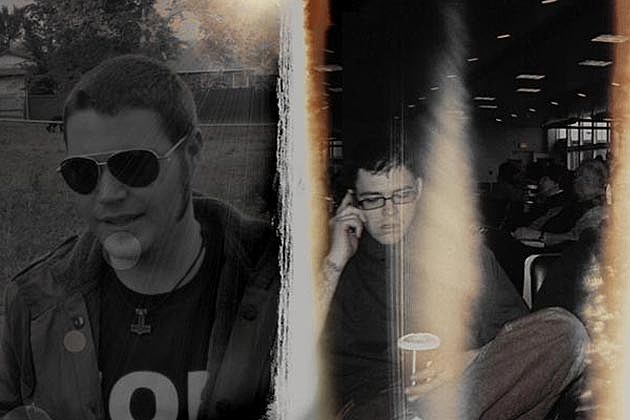
. . .
Do you feel Man’s Gin will chart a similar artistic course? Will the second Man’s Gin album be substantially different from Smiling Dogs?
Yeah, definitely. I always like to see how far I can push the limits, so with Man’s Gin there is all kinds of room for expansion and new territory. I don’t want to ever pigeonhole myself, so it is always on my mind to try new things and move forward. Man’s Gin is a different animal than Cobalt, so I’m like a chemist working with new chemicals. Right now we’re working on the second album, and even though I’ve been playing with these guys (Josh Lozano and Scott Edward) for something like two years now, it’s entirely different than working on my own for the most part. New ideas get thrown around, and the vision and direction of the music is always a topic of discussion. When I’m working with Phil on Cobalt music, we share a brotherhood and a long-standing friendship as well as a similar philosophical approach. With Man’s Gin, the ideas are a little more diverse and spread out, so I’m dealing with absorbing ideas as well as trying to maintain an ultimate focus as to where the band is going. But that is a positive thing. Jamming with Josh and Scott has created some great music so far, and I believe the next record is going to be very ambitious. The songs are becoming more expansive, and the sound is getting bigger. On our last tour out to Chicago and back we had two drummers, one doing full drum set and the other doing cymbal colors and percussion. It really worked out nicely, and I like the fact that we are building the machine to be bigger, stronger, and more effective. So steadily I’m building Man’s Gin in the same fashion as Cobalt—always thinking forward and maintaining the correct approach.
Do you ever feel Man’s Gin is ghettoized by your association with Cobalt? I don’t mean that in a derogatory way—but Man’s Gin is a dark folk/Americana/rock act that gigs with metal bands and seems to be covered almost exclusively by media outlets that know you from Cobalt; obviously Profound Lore is a forward-thinking and experimental metal label, but it’s a metal label nonetheless. Yet were Man’s Gin freed from those associations, it might receive coverage from a wider range of media outlets and thus a wider range of listeners. (Or it might receive no coverage whatsoever, I suppose.)
That is something I think about a lot. And that is also why I sort of keep my distance from the ‘scene’. I wish more people were open-minded about music. There are so many fans out there that just won’t listen to something that doesn’t have distorted guitars in it. On the other hand, though, there are a lot of people out there who have been open to both Cobalt and Man’s Gin, which has been really nice. I feel like the Man’s Gin music harnesses the spirit and mood that many metal bands are striving for. It’s all about the spirit and the vibe and the presentation. Not how loud or fast the music is.
The association between Cobalt and Man’s Gin has been an obstacle of sorts, though. It is, however, something we can use to our benefit. It’s cool to be able to open for a black metal band one night and then a folk band another night. That allows for mobility. I’ve always liked Clutch for that reason. They’ve headlined their own tours; they’ve opened for Cannibal Corpse and High on Fire; they’ve played blues festivals; they’ve played metal festivals. They have a strong fan base across the board because they create music that transcends genres.
But yeah, I do think that we need to start bringing Man’s Gin to new fans and markets as much as possible. I just want people to like the music for what it is. Good lyricism. Good songwriting. Well-played tunes. We’re slowly building up that approach as we go. You can’t please everybody, but there are a lot of people out there that haven’t heard what we’re doing who deserve to. That’s what keeps me going.
. . .
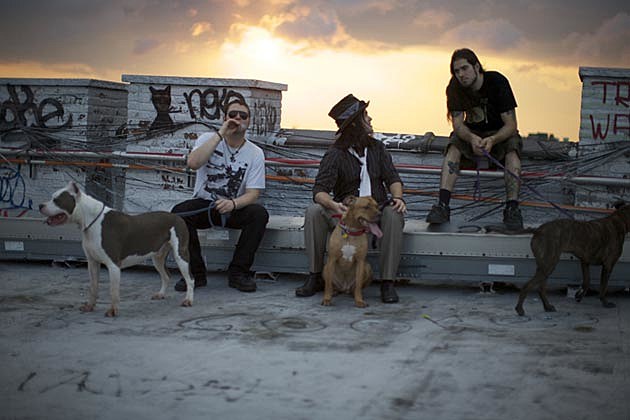
. . .
You’ve hinted at the possibility of Cobalt playing live–even though the band has only actually played live twice, and those shows came at the very beginning of its career. How realistic is this possibility? How might those live shows be arranged? A tour? A handful of regional gigs? What might the construction of the band look like? When might it occur?
I talked to Phil today. He just got back from his second two-year deployment in Baghdad. He’s in good spirits, and it was good to say hello for the first time in a while. He’s back in Kansas right now with his family, and he’s planning on going to drill sergeant school in April of 2012. Cobalt has been offered some live opportunities for spring ’12, so we’re currently trying to work out whether or not that is a plausible thing to do, considering his schedule. We’re talking about a Scion Fest showcase in March or April, which may or may not happen, depending on the timing. If it’s in March we’re going to try our best to make it happen.
But in general, yes. There will be live Cobalt shows in the future. As is everything Cobalt, it will all depend on chance, luck, and timing. With Phil being in the army there’s no way to do full-on tours, but we absolutely plan on doing some special shows at festivals with some shows based around that. It will be more like the sporadic nature of how Neurosis has been conducting themselves over the last few years. “Catch it if you can” kind of thing.
I have musicians lined up to cover the live situation. Just waiting on the “go” to get everything together. It’s a process. As Cobalt is a patient entity, so must the listeners be. But don’t worry—we’re on top of it. Total coverage.
Plenty of the world’s finest black metal acts NEVER play live, by design. Have you considered the possibility that Cobalt might be one of those bands? Why the drive to bring Cobalt to the stage? (NB: I say this as someone who would have rescheduled his wedding to see Cobalt live.)
Oh yeah, definitely. I really never even thought about doing Cobalt live after we stopped playing as a two-piece and Phil joined the army. And I do have a lot of respect for the mystery created by artists who don’t do live shows often, if not never.
The reason I have considered doing Cobalt live is the overwhelming response our music has had and the enthusiasm we’ve received for our records. It’s for the fans really. I mean, we receive emails and comments quite regularly from people all around the world wanting to see Cobalt live, so if we can work it out, I’d like to be able to deliver that. I also like the idea of playing the songs in a live environment and seeing what happens. There is such power and vision in the music that would be amazing to see come to life in a live setting, especially at this point.
On the other hand, I have no desire to bastardize the name by presenting a half-assed show that doesn’t have any kind of finality. So therein lies the dilemma. We will do live shows at our own discretion. First and foremost comes Phil and myself and what we want to do. It is possible that we just decide to work on our new record. Fingers crossed, I suppose.
. . .
Cobalt live 12/10/04
. . .
Along with Cobalt and Man’s Gin, you play in Jarboe’s band. What is your contribution to her music, and how does that work affect what you do outside of her band?
Working with Jarboe over the years has been amazing. She is both a hero of mine and a great friend. She’s one of the remainders of that die-hard breed from the NYC scene in the ’80s. I respect her for the fact that through good times and hard times she maintains her same approach and diligence toward music as an art form. She’s a real diamond in the rough. She’s done so much over the years that it’s staggering. And she still loves music at its base. She believes in the soul and the presentation of music, and she isn’t jaded by trying to be cool or up to date. She just does what she’s always done. Make more music and keep trying to push the vision further.
She has been a fantastic friend to have and has encouraged me to keep going on and pursue my vision despite criticism or doubt. She has seen it all, from high times to low times, and kept her cool through so much shit.
Playing as her drummer has been a hell of an experience. We’re also in talks right now for a possible tour next spring (2012) with Man’s Gin being her backing band. There aren’t any confirmations yet, but if it does happen we’ll be playing some of her songs and some of our songs, kind of like a collaboration ensemble type of thing. She will also be singing on the next Man’s Gin record. It’s a serious gift to play with one of your personal heroes, and I embrace it with open arms.
You and Phil frequently make literary references in your work and in discussions of your work; Gin featured images of Hemingway in its sleeve art and the sequencing was arranged as a tribute to Hemingway and Hunter Thompson. Can you tell me why you chose to make those references? At what point did you know Gin would be so overt in paying tribute to those writers? Was that a decision made after recording was over, or did it affect the process of creation?
Phil and I are both avid Hemingway and Thompson fans. I still read both writers and always will. At the time of putting Gin together, we were particularly inspired by the powerful individualism, determination, and adventurous ambition of those two writers. They were both highly eccentric people who we relate to on many different levels, and they both displayed wild creativity and style, along with living excessive lifestyles and jumping at any experience that they came across. Phil and I are both very much this way, both on our albums and in real life.
But yeah, at the time that we were putting together the Gin layout we thought that it would be great to pay tribute to our literary heroes. We also thought that it was a pretty original idea to introduce American literary icons into the extreme metal world. A lot of the extreme European bands sing about Norse folklore and Tolkien and all of that mythical imagery, so this was our grassroots American response in a way. Cobalt relies entirely on our life philosophies and worldviews. Our music is always extremely personal and well thought-out. Adding this thinking-man’s aspect to extreme music is something we love to do. Not all metal enthusiasts are idiot meatheads, you know? We celebrate the ‘noble savage’ idea.
At the time of tracking Gin, Phil was in town staying at our Denver house. One day I got home from work, and he had put together the cover art that day with the young Ernest Hemingway in the Italian army photo and the Cobalt logo up the side, the picture looking burnt and worn out. I said, ‘Yep, that’s the cover.’ And it went from there. We kind of kept the ball rolling with the theme being great American writers. Both writers are also referenced in some of the album lyrics.
The photo of Thompson shooting his own typewriter in the gate-fold art also rings true with the Cobalt attitude. It’s good to build up and then tear down. It’s a love/hate relationship. It’s a natural cycle. I mean, we burned a pile of our Landfill Breastmilk Beast EP CD’s in my backyard in Denver with lighter fluid to light the photos that you see in the Gin layout. It was an act of destroying what you’ve created in order to create something new. You don’t always have to torch your own albums or shoot your own books with a shotgun to be creative, but sometimes it helps.
. . .
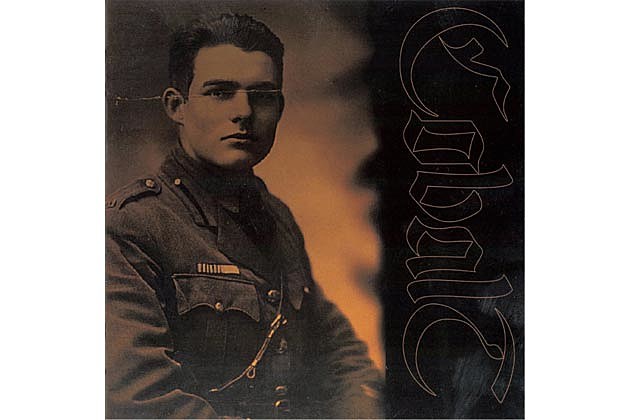
. . .
In concert, Man’s Gin will occasionally play a Cobalt song: “Dry Body”, from Gin. Do you view that song as the point of connection between your two musical identities—and if so, where and why is that connection fused? Or is it a nod to Cobalt fans in the audience who might have come out to see Man’s Gin?
Yeah I suppose that song is a turning point and a landmark in its own way. It even predates Smiling Dogs. I wrote “Dry Body” on my blue couch in Fort Collins, Colorado. I was going through an intense period of philosophical searching and dealing with the fact that no religion can explain or nearly even hint at a logical meaning of our existence here on earth. So that song is all about a loss of belief in what I had been taught as a middle-America, God-fearing youth, but it’s also about the triumph of knowing that you’ve tested these boundaries and come to a coherent conclusion.
I was in a period of deep contemplation. I was sitting there thinking, “Well, if this ‘god’ or this ‘person in the sky’ that everyone is fighting over is this transient being who basically sits there and watches his sarcastic jokes unfold in front of him (the ridiculous things that happen on Earth every day), then I’m going to write a song against that.” My beliefs have since then matured further in certain ways, but that was a young person at a certain point in time.
That was the first song I ever wrote with a singing voice. Even though it is very deep and dark, it was my first attempt at using singing rather than shouting or screaming. It still holds strong today, as I see it. It’s also a song influenced by tripping on mushrooms in the mountains and getting lost in the wilderness and facing desperation and danger and primitive instinct and facing your own animal side, and then seeing John Wayne in the clouds waving at you.
As far as the connection with Man’s Gin goes, yeah, there is certainly a connection between the heaviness and folkiness that I like to embrace. Doing that song live has been a great experience, and I’ve had a lot of exhilarating times on the stage performing it. It leaves room for a lot of primitive, naked, raw intensity that I wish I could see when I go out and see a random band. I’m proud of it.
To that end, do you see more points of connection being fused between the two acts in future works? Might the next Cobalt album feature numerous songs that could wind up in Man’s Gin sets—i.e., songs that feature more textured (“clean”) singing, or songs built around an acoustic guitar? Alternately, might Man’s Gin embrace the instrumental ferocity and overt brutality of Cobalt in some measure?
Right now I’m working on fusing the two together as well as keeping them apart. As I’ve matured, I’ve become more aware of stylistic boundaries and not being afraid to go certain places based on fear of criticism. It’s important to create music that is genuine and from the heart. And as long as you do that then you have succeeded. Whether or not you receive massive recognition or just a handful of fans, the most important thing is to remain honest to your ideas and intentions and to have no fear of change. There is always a connection between Cobalt and Man’s Gin, and in the future I can only see the two progressing and feeding each other. The next Man’s Gin album has some heavier moments, and as I’m mapping it out it looks like it will be more complex and diverse. It’s very exciting. I like that we can attain a seriously heavy and moving vibe without “heavy metal guitars” with Man’s Gin, so that’s an aspect I want to hold on to and use to its fullest potential. But there will be heavier moments on this next record. So far there are some real gems on the horizon. And as far as the next Cobalt record, the ideas are reciprocal. I guess people will just have to wait and see.
. . .
Man’s Gin performing Cobalt’s “Dry Body”
. . .
You moved from Colorado to New York City about two and a half years ago, right? What are your feelings about the metal scene in NYC today? How has it changed in the time since you arrived here?
Yeah I moved to New York two and a half years ago. My initial plunge into this great big city came about because I was offered a spot to tour Europe drumming for Jarboe. I was in Denver previously, and at the time of the first Jarboe tour I was sort of at my wit’s end. I was hating my daily life in Denver because it wasn’t reaching the landmarks that I obsess about, and the offer to go over and play drums in Europe was a wind in my sails. So I came out here, embarked on my first trip to Europe, played drums in different countries and places, and upon arrival back I decided that this was my new home.
Overall, though, I’ve never felt that any certain place was my home. I prefer changing my surroundings and making music itself my real home. I can always find refuge in a good song and music has been something of a vehicle to carry me to the next place. That being said, I really like New York. It’s a no-holds-barred kind of town, and I like the freedom of living here. I’ve seen all kinds of great bands that I never would have seen living in Colorado, and I’ve been presented with so many opportunities here. We recorded Smiling Dogs here. I’ve done shows with musicians whom I consider to be personal heroes. Touring Europe twice with Jarboe being the first big ones. Man’s Gin opened for Scott Kelly and Wino at the Mercury Lounge. We opened for Dax Riggs and his band as well. So I’ve seen a lot of dreams coming true right in front of me and happening all around me, and I must say I am extremely grateful to have this crazy, lucky wave to ride. I have believed all of my life in music and human expression, and to have that carrying me into new situations and opportunities has been great.
As far as the metal scene goes, I kind of keep my distance from a lot of it. There are some great bands playing out, but I’m sort of a recluse when it comes to going to shows. That being said, I’ve seen some amazing shows since living here: the Sleep reunion shows, Melvins are always coming through, I saw the Swans twice last month, the list goes on.
My view about music hasn’t really changed since moving here. I have always been very selective about the music I listen to. It has been a hell of a change coming here and having any number of possible shows to see every single night. When I was living in Colorado, there would be a show to see every couple of months, but here there’s a show every goddamn night. So you have to pick and choose what you’re going to be a part of. I have become incredibly keen on how many bands are trying to do the same thing and which ones are doing something original.
You said, “I’ve never felt that any certain place was my home. I prefer changing my surroundings and making music itself my real home”. That brings up, for me, a secondary question: Is your music influenced by your physical surroundings and the community in which you find yourself? Cobalt is exclusively a product of Colorado, correct? And Man’s Gin started in Colorado but came to fruition in NYC, right? Do you find your approach to writing—lyrically, instrumentally, structurally, whatever—has changed BECAUSE you are now in NYC? If so, can you identify ways in which NYC colors your new work, and ways in which Colorado colored your work in the past?
As a musician you are always sort of absorbing your surroundings, and no matter what, your everyday environment will affect you. I have found many positives and negatives living in all of the places that I’ve lived so far in my life. For writing intimate, thought-out songs, sometimes it’s better to be in a quiet place like Colorado where you have a backyard and some room. On the other hand, bringing music from Colorado to New York has been a really interesting experiment, and I think I’ve grown stronger as a musician through my experiences here, ironically more in the competitive business nature of the beast. It’s kind of weird. When I was living in Colorado I was never once recognized on the street for the Cobalt stuff. And then I come to New York where there is an actual, vibrant music scene, and everybody knows everybody and is enthusiastic about what’s going on. It’s cool to be at bar and have someone come up and say, “Hey man, Cobalt rules!” I’m also a music nerd, so when I see musicians I admire I will always say hello and thank them for their influence on my life. You do, however, have to keep an eye out for people who are just using you to get ahead. I’ve done a good job surrounding myself with genuine, trustworthy people in my few years here.
As far as the writing process, yes it is entirely different than what I was used to when I first arrived here. I think it has made me more competent and determined. New York is an extremely competitive place in pretty much every regard, and to have made it this far thus far is a hell of a thing.
It is different though. When I was in Colorado we always had a jam room in the basement, and I would have my drums there with guitar amps and everything, and I could always go downstairs and jam all night if I wanted to. In NY we have our jam space in Brooklyn that we share with a couple other bands, so I can’t go in there any time I want to get an idea down. I suppose it takes more immediate focus to get creative here. That does create a unique situation that affects your sound. So right now I’m just going with the flow and seeing where it takes me. I have the new Man’s Gin record to put together as well as bringing the new Cobalt monster to life. It’s all about deadlines. If you don’t set them you will never reach them.
So you’re playing in three excellent bands, the financial rewards of which are basically nil, I assume. Are you still bartending to pay rent? Do you enjoy that work?
Yeah it’s not a bad job at all. I like the bar atmosphere of course, and the money is decent. It pays the bills, you know? Ideally I’d like to be doing music full-time and making a living off of it. It’s something I’m working toward. With everything going digital and the number of bands out there these days, it’s becoming harder and harder to make a living playing music. When everything is free no one is making any money.
But there is hope at the end of the tunnel. I have confidence that someday I’ll be looking back at the days when I was poor with a nostalgic sense. I have to embrace the daily grind and go about it one step at a time. The music industry is evolving so quickly these days, and it’s certainly not as simple as it used to be. It used to be that you created an album, and then people would buy it in order to hear it. Now everything is just so immediate and available that it’s really difficult to make a living as an up-and-coming artist. I suppose you have to adapt to the times. We’ll see what happens. The music will keep coming no matter what . . . it’s the money that is lacking. Nowadays you work on a song for six months, and then people can download it for free. That’s OK in a roundabout way, but the change in the way music is exchanged has really thwarted the life of the songwriter.
Man’s Gin did a 2011 Halloween set in NYC in which you paid tribute to Nirvana. I hear a great deal of Alice in Chains in Man’s Gin’s music. Was the Seattle scene of the early ’90s a big influence on you, or are these things just a coincidence? If it was a major influence, how did it influence you?
My formative years as a young man were the 1990s, and I still have a love for that period of music. The ’90s marked the end of an era when the general public enjoyed music played by musicians playing together as a band. For me it was a personal watermark for good music being popular and accepted. It was the last decade of real rock ‘n’ roll. Even though you had to sift through all the shit rock that was going on, you had Soundgarden and Nirvana and the Melvins and Alice in Chains and Jesus Lizard and Neurosis and Sleep and Tool and so many, many others. I don’t mean to be cynical, but it seems that the era of full-length albums is over. Now it’s all about the ‘single’. People call their songs ‘tracks’ or ‘mixes’, and it loses a lot of the human aspect of creating a larger-scale idea by exploring different moods and situations through a series of songs. People don’t say, “So what album have you been listening to?” They say, “So what’s on your playlist?” The patience isn’t there anymore. These days a band like Led Zeppelin or Pink Floyd would still be successful, but there wouldn’t be this huge movement of people who genuinely care and support moving the human experience forward through music the way it was in those times. Maybe I’m just being pessimistic.
I suppose I have to take it all with a grain of salt though. With Cobalt and Man’s Gin we have touched many lives, and that’s nothing to shake your head at. I suppose I’m just stifled regarding the music industry and how to make it a career in these strange times.
Coming back to the original question: Man’s Gin does take influence from the ’90s a great deal. We like to focus on vocal harmonies and well-written guitar parts and song structures written together rather than pieced together on a computer. As I’ve gotten older and reflected more and more on the way I approach songs, I’ve gone back to my formative years as a younger person and found a goldmine in the ’60s, ’70s, ’80s and ’90s. Neil Young never used Auto-Tune. Bob Dylan was successful as a poet and songwriter even though he didn’t have the most beautiful voice. It seems the appreciation for imperfection is really low these days. Everything on the radio is on Auto-Tune.
The ’90s was also something that I had to revisit as I got older and stopped caring about what was cool. There was a period in the later ’90s where my friends and I would only listen to crust punk music, and I discovered black metal and a lot of extreme music that I previously didn’t know existed. That was a period where we kept everything really underground, and nothing else was acceptable to listen to. It had to be the most intense thing you ever heard to be what you were into. So for several years I ignored a lot of what I had grown up on to explore this new, exciting and foreign stuff. It wasn’t until after War Metal was released that I started going back and listening to my “roots” music. But it was also a great moment for me with the Cobalt music because I started blending influences like the tribal drumming and expansive song structures of a band like Tool or Neurosis with some crazy Canadian war metal or Norwegian black metal ideas. I guess that was a real turning point. Maintaining these intense metal influences and bringing in the psychedelic stuff that was going on with the records I grew up on.
. . .
Man’s Gin performing Nirvana’s “Milk It”
. . .
Looking back at the body of work you have created, and looking forward at the work you have ahead of you, can you pinpoint a single piece of music in your catalog (song or album or lyric or riff) of which you are most proud? The one piece of music that best defines you as an artist and a man? The one that you look back on and say, most confidently, “I nailed that one”? The one that you feel is the standard you now have to match? The one which, at the time, was the highest hurdle, and the hurdle you still cannot believe you cleared?
So far I have seen each album as a personal landmark. Each record has marked a different period in my life as well as the people I’ve worked with. I suppose I do have certain high points. From a drummer’s perspective I am very proud of “Two-Thumbed Fist” as a whole and the breakdown and build-up in the middle. “Invincible Sun” was my favorite song on Eater of Birds at the time . . . as well as the “Eater of Birds” song itself, which I was really proud of. “Empire of the Moth” was my favorite in the War Metal days. On Smiling Dogs I’m the most proud of “Doggamn” because of its message and lyricism.
The best way to write new music is to be consumed by it and passionate about making it the best that it can be at any cost. It’s all about your own personal calling and pursuing it. It’s all about ambition. Like Genghis Khan or Vlad the Impaler.
You and Phil are very close, and you’ve been close since before he chose to join the army. Do you remember when he announced to you that decision? How did you react—both externally and internally (i.e., what did you say to him, and what did you feel)? Do you worry about his safety, or are you able to divorce yourself from the danger he faces on a regular basis?
Phil and I have been great friends since we were teenage punkers riding skateboards and listening to Crass with our Stinktown (Greeley, Colorado) friends, so yes he is a brother to me and an ally. As far as his joining the army and being in dangerous situations, I have never been afraid that something would happen to him because he is Phil McSorley. You don’t fuck with that guy. I mean I’ve had a natural concern for him being at war, but as a person I’ve always known that he will always be all right because of his strength and determination.
. . .
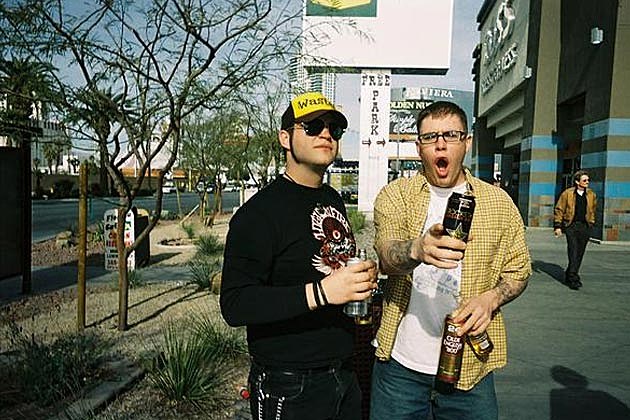
. . .
What’s the next step for you, as an artist and a person? Marriage? Kids? Will you stay in New York, or do you see yourself settling elsewhere? Do you have more musical incarnations in mind, or will your focus remain on Cobalt and Man’s Gin?
For right now I’m focusing on Cobalt and Man’s Gin, both live and on record. I’m also excited about going back to Europe and seeing how the Jarboe/Man’s Gin thing works out. As far as long-term stuff, I would like to eventually find a woman to take care of who could take care of me as well. It would be cool to find a girl who could be supportive both personally and artistically and keep me moving along with staying on my regimen of writing new songs and pushing forward and planning out tours, etc… I mean, I already do that myself, but a helpful hand never hurts. As far as having a child is concerned, with the economic situation as it is right now it’s a difficult decision to bring a new life into this world, but it is a possibility that I would consider years down the road. For now I’m enjoying the ride. I’m a romantic at heart, but I am acutely aware of how bad things are at the moment. I don’t know; maybe I’ll just wander the Earth as a lone wolf. Kids have cell phones these days. The Internet has taken over everything like it’s the goddamn Matrix. There are no jobs. There are too many people on the planet. Book stores are going out of business. The majority of record stores went out a couple years ago. I feel like an old man even though I’m not. But there is work to be done and unknown lands to conquer. The Ubermensch will strive forward. It’s a matter of kicking against the pricks. Just keep kicking through one day at a time.
. . .
Cobalt – “Arsonry”
. . .
Cobalt – “Ulcerism”
. . .
Man’s Gin – “Nuclear Ambition”
. . .
BUY SMILING DOGS
Profound Lore (CD)
Amazon (MP3 download)
. . .
BUY GIN
Amazon (CD)
Profound Lore Records (CD)
. . .
